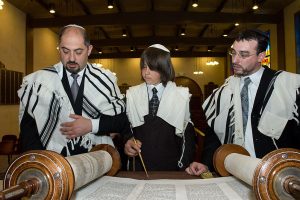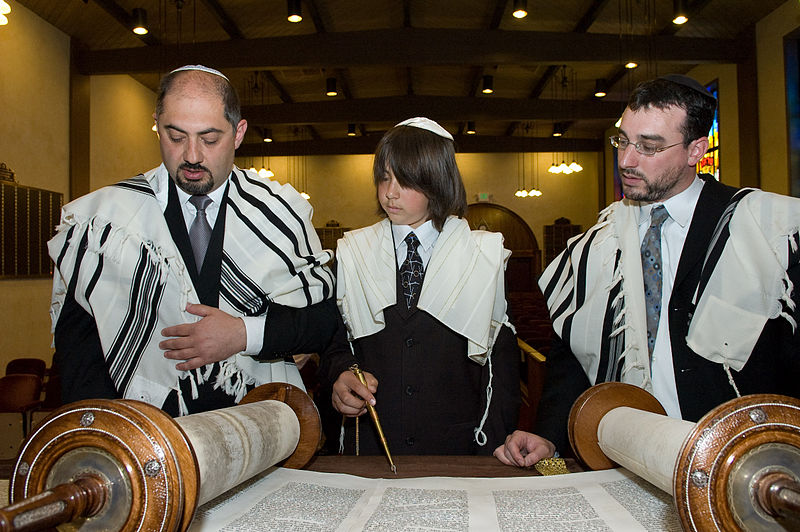
A Bar Mitzvah or Bat Mitzvah is a prominent element of contemporary Jewish practice, with the level of celebration seemingly without limit or restraint. However, this essay is not about Bar and Bat Mitzvah excess. Much has already been written on this subject.
Sufficed to say that ostentatious celebrations are in bad taste and present a distorted image of Judaism to Jews and non-Jews alike. One recent conversation with a Christian friend essentially tells the story. He was actually surprised to learn that a Bat/Bat Mitzvah is actually a religious event.
What I wish to address is that the period of Bat or Bat Mitzvah preparation is, for the most part, a squandered opportunity. Furthermore, the learning process itself often does more harm than good.
Although most synagogues require that Bar Mitzvah/Bat Mitzvah students also attend religious school or a Jewish day school, overwhelmingly, the greatest time and energy is allocated to learning to read Hebrew prayers, to read from the Torah, and chant the Haftarah.
I will be blunt. None of these are skills that the vast majority of Jewish adults are likely ever put to use.
It is no secret that the overwhelming majority of Jews today rarely attend worship services, except on the High Holy Days. Even on occasions where they may be called to the bima for an aliyah, almost all rely on the transliteration. Therefore, allocating many hours learning to read Hebrew passages, most of which are soon forgotten, is a huge waste of time and, even worse, is unlikely to lead to greater Jewish commitment.
To make matters worse, although the young person may gain some understanding of the prayers and passages that they will read at their Bar or Bat Mitzvah, very few will acquire any understanding of the vocabulary or grammar of the Hebrew. Essentially, most students are spending many hours to achieve a fleeting competence of reading and/or chanting mere syllables written in Hebrew letters. The students are not learning Hebrew; they are learning how to pronounce Hebrew words.
I am not deprecating the importance, beauty and sanctity of Hebrew. It is the historic and universal language of the Jewish people. I have a deep and abiding love of Hebrew. As a lifelong student of Judaism, I have gained much understanding from reading Biblical and rabbinic texts in their original language. I also greatly enjoy being able to communicate in the Hebrew language when I visit Israel. But this is not what is being taught in Bar/Bat Mitzvah studies.
The usual justification for spending so much energy learning to recite Hebrew words is simple: it is what a Bar Mitzvah or Bat Mitzvah is supposed to be. It is a tradition. This argument is a tautology.
To say that we should do something because it is traditional is merely to say that since it has been done in the past, therefore we should continue to do it, which is no reason at all.
Tevye’s words and gestures in the well-known song “Tradition” from “Fiddler on the Roof” express this thought perfectly. “Why do we do these things?” he asks and then responds with a shrug: “Tradition!”
We could compile an endless list of traditions, religious and otherwise, that may have seemed worthwhile at some time in the past, but are obsolete today.
My contention is that learning to read Hebrew words mechanically, but without understanding, is an obsolete tradition, and usually a tedious one as well, which squanders those precious hours and months that could be devoted to real learning that could be of lifelong value. I will take this one step further: If the young person learns to recite Hebrew prayers but does not understand what he or she is actually reading, does this even constitute praying? I don’t think so.
What is the essential purpose of Bar Mitzvah or Bat Mitzvah? It is to inculcate a love of Judaism and a positive sense of identity with the Jewish people.
I am certain that almost all Jewish educators and parents are in agreement. However, I contend that rarely is this goal achieved. The most compelling evidence is that the vast majority of Bar/Bat Mitzvah students quit their religious studies as soon as the service has past. To make matters worse, many parents resign from the congregation shortly after their last child’s Bar/Bat Mitzvah.
The precious time that we have with young people ought to be devoted to helping them understand the most important principles, historical events, ideals and ethical precepts of Judaism so as to prepare them to live as committed Jews. Therefore, the course of study would be better devoted to learning what it means to live a Jewish life rather than mere Hebrew recitation.
There are a number of excellent texts that are readily available. I think especially of Rabbi Joseph Telushkin’s marvelous books, “The Book of Jewish Values” and “Jewish Literacy.” Jewish educators should use their own favorite materials as the basis of true dialogue with their students.
In addition, I strongly believe that the learning process should involve parents as well. Parents should read the materials with their children and discuss these topics with them. We are all familiar with the standard situation where the parent drops off their child for Hebrew class, picks them up afterward. That is usually the extent of parental involvement, except for planning the celebration. This is not sufficient. There needs to be a much greater sense of partnership between parents and teachers in order for there to be lasting impact.
But what about Hebrew? I agree that there is value in acquiring the basic ability to read Hebrew. Hebrew does provide a link with the Jewish past and with Jewish people everywhere today. Hebrew remains a valuable component of Jewish identity. But this does not mean that so much time should be devoted to polishing recitation of specific prayers and readings for a one-time-only event. A reasonable objective would be for the young person to learn how to pronounce Hebrew, which is not that difficult or time consuming and then to learn to read a number of verses from the Torah. For those who believe that the young person should also read Hebrew prayers at the ceremony, there should be no objection to reading of Hebrew materials in transliteration. The words come out the same.
Some may say that this would be a dumbing down of Bar Mitzvah or Bat Mitzvah. I disagree. I contend that it is exactly the opposite. We could be raising the level of learning significantly by using the study time with our students much more effectively. By including the parental component, this further enriches the experience for the entire family.
After all these years, I continue to believe in the transformational possibilities of the Bar Mitzvah or Bat Mitzvah experience. However, all too often (and I believe that most rabbis and educators would agree) it is a misguided effort. For the sake of our children, and for the sake of the future of Judaism, I am convinced that the values-based bar/bat mitzvah offers the greatest promise. As a rabbi, this is the approach that I intend to pursue enthusiastically. It is the better way.
Tags: bar mitzvah